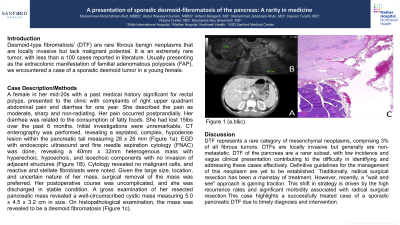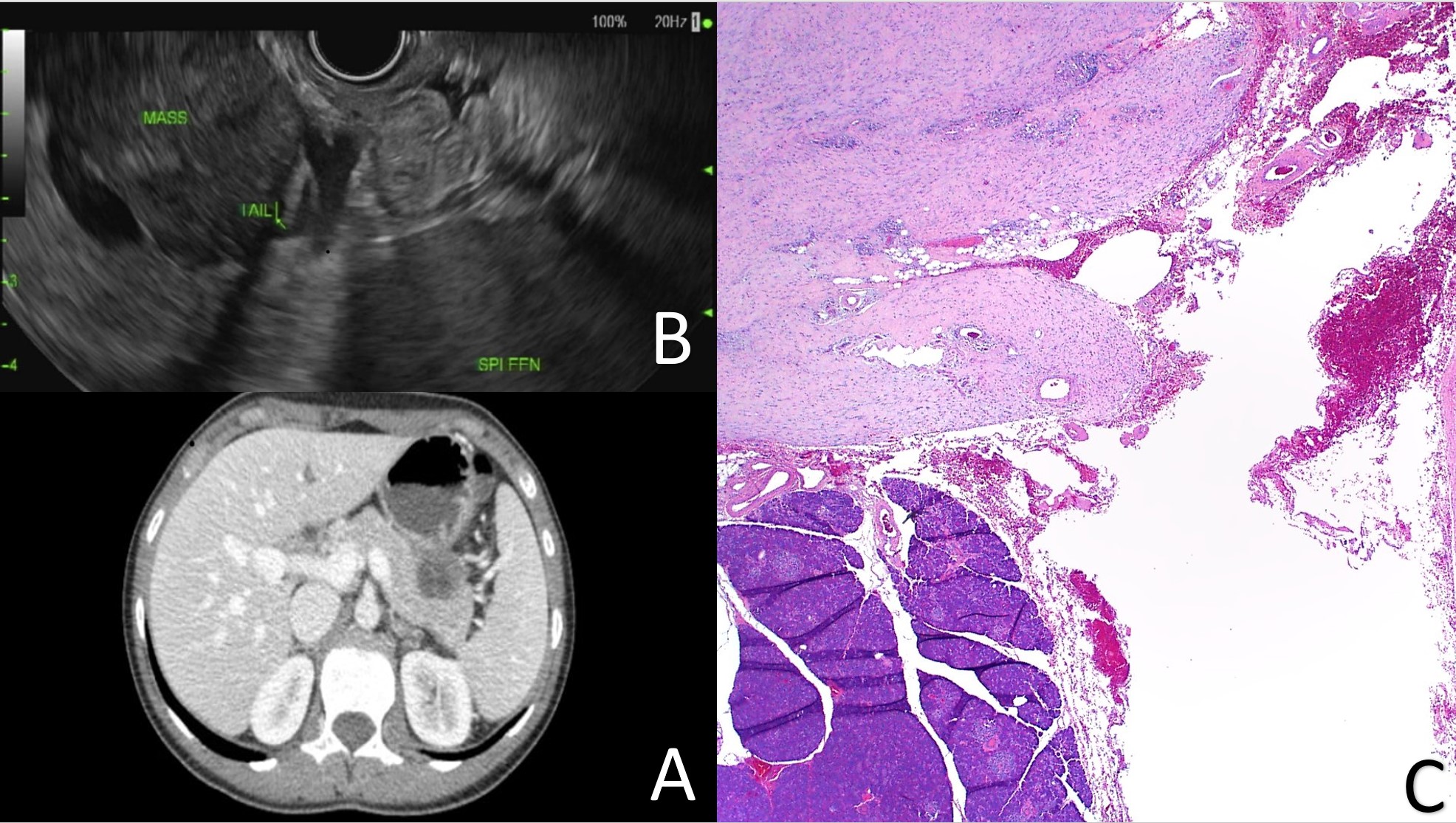Tuesday Poster Session
Category: Biliary/Pancreas
P3568 - A Presentation of Sporadic Desmoid-Type-Fibromatosis of the Pancreas: A Rarity in Medicine
Tuesday, October 29, 2024
10:30 AM - 4:00 PM ET
Location: Exhibit Hall E


Muhammad Jahanzaib Khan, MD
Mather Hospital, Northwell Health
New York, NY
Presenting Author(s)
Muhammad Abdurrahman Butt, MBBS1, Abdul Wasaay Khurram, MBBS1, Asfand Bangash, MD2, Muhammad Jahanzaib Khan, MD3, Hassan Turaihi, MD4, Victoria Durkin, MD4, Mouhanna Abu Ghanimeh, MD4
1Shifa College of Medicine, Islamabad, Islamabad, Pakistan; 2Shifa International Hospital, Islamabad, Islamabad, Pakistan; 3Mather Hospital, Northwell Health, New York, NY; 4University of South Dakota Sanford School of Medicine, Sioux Falls, SD
Introduction: Desmoid-type fibromatosis’ (DTF) are rare fibrous benign neoplasms that are locally invasive but lack malignant potential. It is an extremely rare tumor, with less than a 100 cases reported in literature. Usually presenting as the extracolonic manifestation of familial adenomatous polyposis (FAP), we encountered a case of a sporadic desmoid tumor in a young female.
Case Description/Methods: A female in her mid-20s with a past medical history significant for rectal polyps, presented to the clinic with complaints of right upper quadrant abdominal pain and diarrhea for one year. She described the pain as moderate, sharp and non-radiating. Her pain occurred postprandially. Her diarrhea was related to the consumption of fatty foods. She had lost 15lbs over the past 6 months. Initial investigations were unremarkable. CT enterography was performed, revealing a septated, complex, hypodense lesion within the pancreatic tail measuring 28 x 26 mm (Figure 1a). EGD with endoscopic ultrasound and fine needle aspiration cytology (FNAC) was done, revealing a 40mm x 32mm heterogenous mass with hyperechoic, hypoechoic, and isoechoic components with no invasion of adjacent structures (Figure 1B). Cytology revealed no malignant cells, and reactive and stellate fibroblasts were noted. Given the large size, location, and uncertain nature of her mass, surgical removal of the mass was preferred. Her postoperative course was uncomplicated, and she was discharged in stable condition. A gross examination of her resected pancreatic mass revealed a well-circumscribed cystic mass measuring 5.0 x 4.5 x 3.2 cm in size. On histopathological examination, the mass was revealed to be a desmoid fibromatosis (Figure 1c).
Discussion: DTF represents a rare category of mesenchymal neoplasms, comprising 3% of all fibrous tumors. DTFs are locally invasive but generally are non-metastatic. DTF of the pancreas are a rarer subset, with low incidence and vague clinical presentation contributing to the difficulty in identifying and addressing these cases effectively. Definitive guidelines for the management of this neoplasm are yet to be established. Traditionally, radical surgical resection has been a mainstay of treatment. However, recently, a "wait and see" approach is gaining traction. This shift in strategy is driven by the high recurrence rates and significant morbidity associated with radical surgical resection.
This case highlights a successfully treated case of a sporadic pancreatic DTF due to timely diagnosis and intervention.

Disclosures:
Muhammad Abdurrahman Butt, MBBS1, Abdul Wasaay Khurram, MBBS1, Asfand Bangash, MD2, Muhammad Jahanzaib Khan, MD3, Hassan Turaihi, MD4, Victoria Durkin, MD4, Mouhanna Abu Ghanimeh, MD4. P3568 - A Presentation of Sporadic Desmoid-Type-Fibromatosis of the Pancreas: A Rarity in Medicine, ACG 2024 Annual Scientific Meeting Abstracts. Philadelphia, PA: American College of Gastroenterology.
1Shifa College of Medicine, Islamabad, Islamabad, Pakistan; 2Shifa International Hospital, Islamabad, Islamabad, Pakistan; 3Mather Hospital, Northwell Health, New York, NY; 4University of South Dakota Sanford School of Medicine, Sioux Falls, SD
Introduction: Desmoid-type fibromatosis’ (DTF) are rare fibrous benign neoplasms that are locally invasive but lack malignant potential. It is an extremely rare tumor, with less than a 100 cases reported in literature. Usually presenting as the extracolonic manifestation of familial adenomatous polyposis (FAP), we encountered a case of a sporadic desmoid tumor in a young female.
Case Description/Methods: A female in her mid-20s with a past medical history significant for rectal polyps, presented to the clinic with complaints of right upper quadrant abdominal pain and diarrhea for one year. She described the pain as moderate, sharp and non-radiating. Her pain occurred postprandially. Her diarrhea was related to the consumption of fatty foods. She had lost 15lbs over the past 6 months. Initial investigations were unremarkable. CT enterography was performed, revealing a septated, complex, hypodense lesion within the pancreatic tail measuring 28 x 26 mm (Figure 1a). EGD with endoscopic ultrasound and fine needle aspiration cytology (FNAC) was done, revealing a 40mm x 32mm heterogenous mass with hyperechoic, hypoechoic, and isoechoic components with no invasion of adjacent structures (Figure 1B). Cytology revealed no malignant cells, and reactive and stellate fibroblasts were noted. Given the large size, location, and uncertain nature of her mass, surgical removal of the mass was preferred. Her postoperative course was uncomplicated, and she was discharged in stable condition. A gross examination of her resected pancreatic mass revealed a well-circumscribed cystic mass measuring 5.0 x 4.5 x 3.2 cm in size. On histopathological examination, the mass was revealed to be a desmoid fibromatosis (Figure 1c).
Discussion: DTF represents a rare category of mesenchymal neoplasms, comprising 3% of all fibrous tumors. DTFs are locally invasive but generally are non-metastatic. DTF of the pancreas are a rarer subset, with low incidence and vague clinical presentation contributing to the difficulty in identifying and addressing these cases effectively. Definitive guidelines for the management of this neoplasm are yet to be established. Traditionally, radical surgical resection has been a mainstay of treatment. However, recently, a "wait and see" approach is gaining traction. This shift in strategy is driven by the high recurrence rates and significant morbidity associated with radical surgical resection.
This case highlights a successfully treated case of a sporadic pancreatic DTF due to timely diagnosis and intervention.

Figure: Figure 1a: Transverse view of CT enterogram highlighting a complex, septated, hypodense lesion within the tail of the pancreas.
Figure 1b: Image from an endoscopic ultrasound highlighting a heterogenous mass.
Figure 1c: Histopathological Specimen showcasing the desmoid tumor adjacent to the pancreas and spleen.
Figure 1b: Image from an endoscopic ultrasound highlighting a heterogenous mass.
Figure 1c: Histopathological Specimen showcasing the desmoid tumor adjacent to the pancreas and spleen.
Disclosures:
Muhammad Abdurrahman Butt indicated no relevant financial relationships.
Abdul Wasaay Khurram indicated no relevant financial relationships.
Asfand Bangash indicated no relevant financial relationships.
Muhammad Jahanzaib Khan indicated no relevant financial relationships.
Hassan Turaihi indicated no relevant financial relationships.
Victoria Durkin indicated no relevant financial relationships.
Mouhanna Abu Ghanimeh indicated no relevant financial relationships.
Muhammad Abdurrahman Butt, MBBS1, Abdul Wasaay Khurram, MBBS1, Asfand Bangash, MD2, Muhammad Jahanzaib Khan, MD3, Hassan Turaihi, MD4, Victoria Durkin, MD4, Mouhanna Abu Ghanimeh, MD4. P3568 - A Presentation of Sporadic Desmoid-Type-Fibromatosis of the Pancreas: A Rarity in Medicine, ACG 2024 Annual Scientific Meeting Abstracts. Philadelphia, PA: American College of Gastroenterology.
